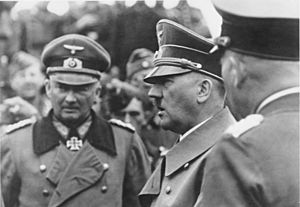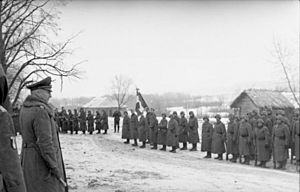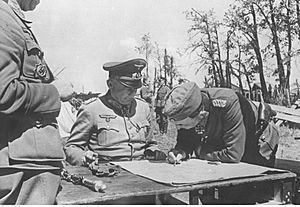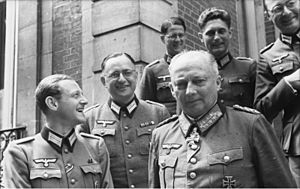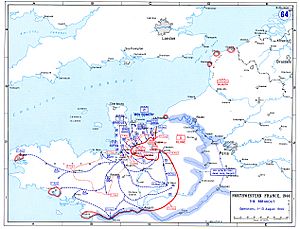Günther von Kluge facts for kids
Quick facts for kids
Günther von Kluge
|
|
|---|---|
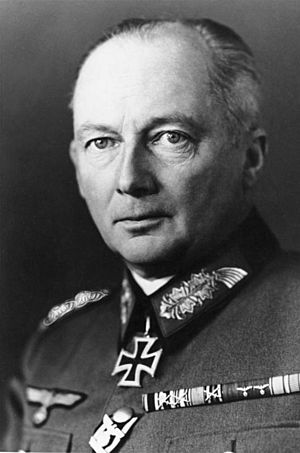
Kluge in 1939
|
|
| Birth name | Günther Adolf Ferdinand von Kluge |
| Other name(s) | Hans Günther von Kluge |
| Nickname(s) | Clever Hans |
| Born | 30 October 1882 Posen, Prussia, German Empire |
| Died | 19 August 1944 (aged 61) Metz, Nazi Germany |
| Allegiance | |
| Branch |
|
| Years of service | 1901–44 |
| Rank | |
| Unit | 46th Field Artillery Regiment |
| Commands held |
|
| Battles/wars | World War I
|
| Awards | Knight's Cross of the Iron Cross with Oak Leaves and Swords |
| Spouse(s) |
Mathilde von Briesen
(m. 1907) |
| Children | 3 |
| Relations | Wolfgang von Kluge (brother) Eike-Henner Kluge (grandson) |
Günther von Kluge (born October 30, 1882 – died August 19, 1944) was a high-ranking German general during World War II. He served as a field marshal and led armies on both the Eastern and Western Fronts.
Kluge commanded the 4th Army during the invasion of Poland in 1939 and the Battle of France in 1940. His success in these campaigns led to his promotion to Field Marshal. He then led the 4th Army in Operation Barbarossa, which was the invasion of the Soviet Union, and during the Battle of Moscow in 1941.
In December 1941, Kluge was given command of Army Group Centre, a large group of armies. Some members of the German resistance against Adolf Hitler worked on his staff. Kluge knew about their plans but would not join them unless Hitler was killed. He remained in command on the Eastern Front until October 1943, when he was seriously hurt in a car accident.
After recovering, Kluge became the Supreme Commander West (OB West) in France in July 1944. His job was to defend against the Allied invasion of Normandy. However, his forces could not stop the Allies. Kluge began to realize that the war in the West was lost. He was later replaced by another field marshal, Walter Model.
Contents
Early Life and Military Career
Kluge was born on October 30, 1882, in Posen, which was then part of Prussia (now in Poland). His father, Max von Kluge, was also a distinguished military officer. He served as a lieutenant general in the German Army during World War I.
In 1901, Günther von Kluge joined the German Army. He was sometimes called Der kluge Hans ("Clever Hans"). This nickname came from a famous horse that was thought to be very smart. Kluge served on the German General Staff from 1910 to 1918. He reached the rank of captain during World War I.
After the war, he stayed in the German army, called the Reichswehr. He became a colonel in 1930 and a lieutenant general in 1934. In 1935, when Adolf Hitler expanded the German Army into the Wehrmacht, Kluge was given command of the 4th Army.
Kluge privately thought that Hitler's aggressive military plans would lead Germany to disaster. He was part of a secret group that wanted to avoid war during the Sudetenland Crisis in 1938. This crisis was about disputed territory, but war was avoided by the Munich Agreement. Even though he disagreed with some Nazi ideas, Kluge was proud of the German Army's growth.
World War II Campaigns
Invasion of Poland (1939)
Hitler planned to invade Poland with two large army groups. Kluge's 4th Army was part of Army Group North. The invasion began on September 1, 1939. The 4th Army moved east from West Pomerania to meet another German army. The city of Danzig fell on the first day.
Kluge's army quickly crossed the Brda River, trapping Polish forces. His forces also captured the city of Brześć after three days of fighting. On September 17, the Red Army invaded eastern Poland. Kluge's forces then handed Brześć over to the Soviet forces. Hitler praised Kluge for his skill in trapping Polish forces early in the invasion.
Battle of France (1940)
For the invasion of France, Kluge and the 4th Army were moved to Army Group A. This plan involved attacking through the Ardennes forest in Belgium and Luxembourg. Kluge's army was to help by crossing the Meuse River.
The invasion began on May 10, 1940, and was very successful. Kluge's forces advanced quickly, reaching the Meuse River in just two days. They established a bridgehead on the west bank of the Meuse on May 13. This forced the French 9th Army to retreat.
Kluge's forces, especially the 7th Panzer Division led by Erwin Rommel, broke through quickly. Between May 16 and 17, Rommel captured many prisoners and tanks. On May 24, Kluge ordered his Panzer units to stop about 16 kilometers from Dunkirk. This pause allowed the Allied forces to gather around Dunkirk and prepare for their evacuation.
On June 5, the second phase of the invasion began. Kluge's 4th Army helped break through at Amiens and reached the Seine River. For his leadership during the invasion, Kluge was promoted to Field Marshal on July 19.
Invasion of the Soviet Union (1941)
Kluge commanded the 4th Army at the start of Operation Barbarossa, the invasion of the Soviet Union. His army was part of Army Group Centre. This large army group also included two fast-moving Panzer (tank) groups.
On July 4, the German High Command placed the 2nd and 3rd Panzer Groups under Kluge's command. This was meant to improve how the fast tank units worked with the slower infantry. However, the tank commanders often disagreed with Kluge's orders.
The German High Command did not expect a long war. They did not prepare enough for prisoners of war or civilians. In Kluge's area, many prisoners and civilians were held in a small outdoor camp. Conditions were very bad, with little food.
In September 1941, Kluge issued an order to his troops. He wanted to stop looting and other criminal activities by soldiers. He threatened strict punishment for those who broke the rules and for their commanders who failed to keep discipline.
Battle of Moscow (1941)
During Operation Typhoon, the German advance on Moscow, Kluge had the 4th Panzer Group under his command. In early October, the 4th Panzer Group helped surround Soviet forces at Vyazma. Kluge ordered them to pause their advance to prevent Soviet forces from breaking out.
The tank commander, Erich Hoepner, was unhappy with this. He believed they could clear the pocket and advance on Moscow at the same time. However, many German units were very low on fuel. Only one Panzer Division was still moving towards Moscow.
On December 1, Kluge finally committed his weaker southern forces to the attack. After the battle, some generals blamed Kluge for the German failure to reach Moscow. However, historians note that Kluge's remaining forces were not strong enough. Moscow was also a heavily fortified city, and the Germans did not have enough troops to surround it. The attacks were called off on December 5, and the Soviet army launched a counter-attack.
Commanding Army Group Centre (1941-1943)
On December 18, 1941, Kluge was promoted to replace Fedor von Bock as commander of Army Group Center. Fierce fighting continued through the winter and spring, but neither side made much progress. The German forces held their ground, but just barely.
On October 30, 1942, Kluge received a special payment from Hitler. This was part of a plan to ensure the loyalty of senior German officers. Kluge accepted the money. His chief of staff, Henning von Tresckow, criticized him for this. Kluge then agreed to meet with Carl Friedrich Goerdeler, who was against the Nazi regime.
Kluge promised Goerdeler that he would arrest Hitler the next time he visited the Eastern Front. However, after receiving another payment from Hitler, Kluge changed his mind and decided to remain loyal. Hitler believed these payments meant Kluge would be completely loyal to him.
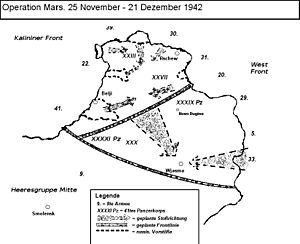
For much of 1942 and early 1943, Army Group Centre was involved in battles around the Rzhev area. These were known as the Battles of Rzhev. Soviet forces gained little ground for their heavy losses. Kluge's forces were weakened, and in early 1943, he got permission to pull back his troops from the Rzhev area.
This withdrawal, called Operation Büffel, shortened the German lines by about 370 kilometers. The retreat involved destroying villages and taking civilians for forced labor.
On March 13, 1943, Hitler approved several attacks, including one against the Kursk area. Kluge refused to attack immediately, believing his forces were too weak. By mid-April, the attacks were postponed due to bad weather and tired German troops.
On April 15, Hitler ordered a new attack called Zitadelle ("Citadel"), which led to the Battle of Kursk. This plan involved a double attack. Kluge's Army Group Centre was to form the northern part of the attack. However, Kluge's general, Walter Model, expressed concerns about strong Soviet defenses.
Hitler met with his officers on May 4. Kluge strongly argued against postponing the attack. General Heinz Guderian, a tank expert, argued against the operation, saying it was "pointless." The conference ended without a clear decision, but Citadel was not canceled.
The operation began on July 5 and quickly ran into trouble. In the north, Soviet forces completely stopped the German advance by July 10. On July 12, the Soviet army launched a counter-attack. Hitler then canceled Citadel. The Soviet forces entered Orel on August 5. By August 18, they reached Bryansk, eliminating the Orel area.
On October 27, 1943, Kluge was badly injured in a car accident. He could not return to duty until July 1944. Field Marshal Ernst Busch took over his command.
Western Front (1944)
In July 1944, Kluge was made Commander of the German Army in the West (OB West). His predecessor, Field Marshal Gerd von Rundstedt, had been dismissed for saying the war was lost. Kluge immediately tried to take charge and boost his troops' confidence in defending Normandy.
However, after visiting the front lines, Kluge told Alfred Jodl that the situation "could not be grimmer." Five days later, Field Marshal Rommel was wounded in a car accident. Kluge took over his command of Army Group B, while also keeping his other post.
The Allies pushed the Germans back in July, setting the stage for a major attack. This attack, Operation Cobra, began on July 25. It aimed to break through German lines in northwestern France. By July 28, the operation succeeded, and German resistance was disorganized. Kluge sent reinforcements, but his forces suffered heavy losses that he could not replace.
By the end of July, the German army in Normandy was in a very bad state. Kluge could no longer hold a strong defensive position. He had no hope of getting more troops. Between August 1 and 4, American forces advanced quickly into Brittany.
Against Kluge's advice to retreat, Hitler ordered a counterattack. He demanded that all available tank units attack to recapture the Contentin Peninsula. Kluge knew this order would lead to the collapse of the Normandy front, but his concerns were ignored. Kluge could only gather four weakened tank divisions. The attack stopped about 15 kilometers from Avranches, mainly due to Allied air superiority. This left German units vulnerable.
A final Allied attack, Operation Tractable, began on August 14. Its goal was to surround and destroy the German 7th Army and 5th Panzer Army near Falaise. In his last order as OB West commander, Kluge ordered a full retreat eastward on August 16. The Allies captured Falaise later that day, leaving a 24-kilometer gap. By August 22, this gap, known as the Falaise Pocket, was closed. This ended the Battle of Normandy with a decisive Allied victory. While about 100,000 Germans escaped, 10,000 were killed and 40,000–50,000 were captured.
Plot Against Hitler and Death
Kluge knew about the 20 July plot to kill Hitler. He agreed to support the plotters if Hitler was killed. In Paris, the plotters arrested over 1,200 SS and SD members. However, after the assassination attempt failed, Kluge learned that Hitler had survived. He then withdrew his support and canceled the arrest warrants.
On August 15, Kluge's car was damaged in an Allied bombing. He lost contact with his forces for several hours. Hitler immediately suspected Kluge of trying to make a deal with the Allies. Kluge was dismissed two days later and replaced by Model. Kluge died on August 19, 1944. In his final message, he stated his loyalty to Hitler. He also wrote that Germany needed to end the war because the German people had suffered too much.
Awards
- Iron Cross (1914) 2nd and 1st class
- Knight's Cross of the House Order of Hohenzollern with Swords
- Clasp to the Iron Cross (1939) 2nd class (September 5, 1939) & 1st class
- Knight's Cross of the Iron Cross with Oak Leaves and Swords
- Knight's Cross on September 30, 1939, as commander of the 4th Army
- Oak Leaves on January 18, 1943, as commander of Army Group Center
- Swords on October 29, 1943, as commander of Army Group Center
Images for kids
-
Soviet plans for the unsuccessful Operation Mars against the Rzhev salient, November – December 1942.
See also
 In Spanish: Günther von Kluge para niños
In Spanish: Günther von Kluge para niños


